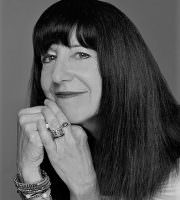by Diane Fahey
On the quay, someone has placed a pile of glittering grey:
twelve wild cats are approaching the best meal in Venice.
They have come from under the garden's locked gates,
the larger cats already revolving that slipperiness
with their claws; the smaller ones edge in, tightrope-walking
cobwebs of fear, eyeing people, dogs, each other…
Still, there is more than enough for all, and huge crusts
to accompany. Late in the banquet, one tosses a fish into air,
as if to coax it back to life, then nets it with tight paws.
Gradually, the cats retire to the garden, are a scatter
of statues on shadowed, sunlit lawn. As in the trick page
of a picture book, they start to merge with the scene,
or disappear: one composes itself in a niche high in a wall;
one softens the outline of a tree; one enters a cellar
as, poised on the threshold, its double stares into the dark.
The last to return to the meal is bulging with young,
her dry black fur rimmed by afternoon's silver.
There, the ginger one which never left still holds
his ground at the centre: eating slowly, barely resting.
When just a fish-head remains, haloed by scales, he moves back
to the garden, cleans muscular chops with grassy paws.
Seeming oblivious, ever wary, he strolls on stiff legs,
his tail's fixed spiral a taxidermist's first attempt.
The cat with white body, black carnival mask, is already
watching a bird, while the tabby with irises greeny-brown
as today's canal water takes in the scene, her eyes
closing, widening — about to surrender to sleep.





